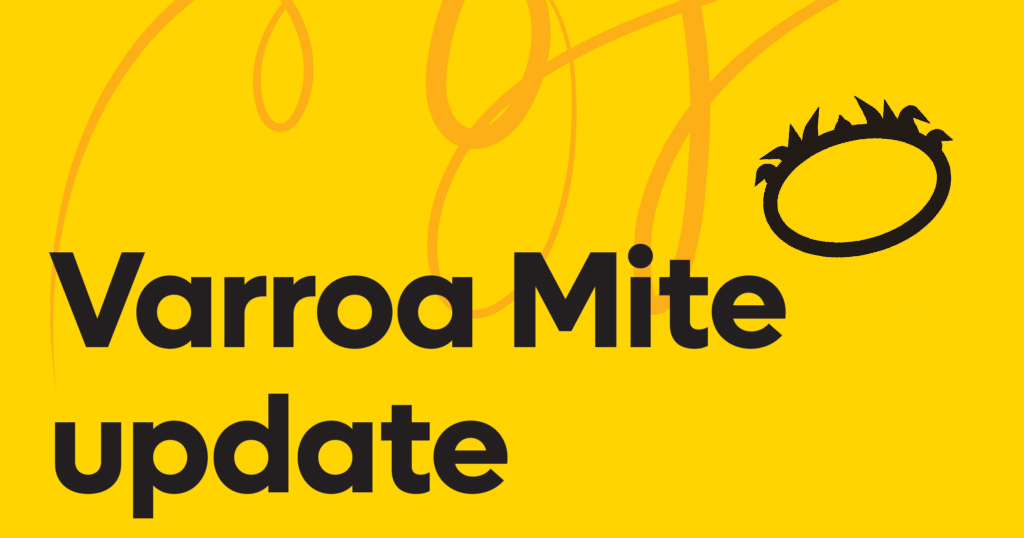AHBIC Industry Update 72 & Important Biosecurity Update Kashmir Bee Virus
20 October 2025National Baseline Survey Result: Kashmir Bee Virus – Victoria As part of the National Varroa Mite Transition to Management Program, a nationwide honeybee virus survey has been completed. During this […]

National Baseline Survey Result: Kashmir Bee Virus – Victoria
As part of the National Varroa Mite Transition to Management Program, a nationwide honeybee virus survey has been completed. During this National Honey Bee Virus Baseline Project bees were collected from 1209 hives, with samples coming proportionally from all states and territories. Eight viruses were tested for across 5,769 pools of the samples.
Of those baseline samples collected from Victorian hives, suspect Kashmir bee virus (KBV) was lab confirmed in August 2025, on European honey bees in a small number of hives across Victoria.
The CCEPP has concluded, the length of time the virus has been present is unknown and that the time between sampling and lab testing has resulted in the likely establishment across a wide geographical area of Victoria.
Despite previously being identified in lab in testing in the 70’s it is believed that this previous testing used older, less accurate testing protocols, resulting in a likely miss-identification of KBV.
It will be recommended to the NMG, that eradication of KBV from Australia is not technically feasible or cost beneficial. AHBIC understands Agriculture Victoria is working with both the affected beekeepers and the Victorian Apiarists’ Association to manage any potential spread as well as to ensure industry needs are considered in any future actions.
About Kashmir Bee Virus (KBV)
Kashmir bee virus can be a serious viral pathogen affecting honey bees and has been linked with colony collapse, especially when combined with other colony stressors such as the presence of other pests or diseases and poor nutrition. Kashmir bee virus persists at low titres in apparently healthy colonies until several stress factors activate the viral multiplication causing the death of the colony.
Kashmir bee virus overt infection occurs in different developing stages of bees without clearly defined disease symptoms. Management focuses on regular colony inspections and an integrated response to colony stressors including controlling varroa mite populations, maintaining hive hygiene and supporting bee nutrition.
Beekeepers: All States & Territories
AHBIC strongly recommends beekeepers across Australia, that it is more important than ever to conduct surveillance on colonies in your care. With spring conditions underway, checking hives for presence of varroa using one of the preferred methods is essential. In those states free of varroa, if you suspect you have found mites then ring the Exotic Plant Pest Hotline 1800 084 881. Continue exotic mite monitoring regularly in your hives, to learn more about alcohol washing check out the nationally agreed resource Bee Pest Blitz: https://www.planthealthaustralia.com.au/beepestblitz/
This is a stressful time for beekeepers across the industry, and we remind beekeepers that there is support and help if you need it.
Mental health and financial support are available from:
- Beyond Blue, 1300 22 46 36
- Lifeline, 13 11 14
- Rural Aid (Mon to Fri 9am – 5pm), 1300 175 594
- Rural Financial Counselling Services
Other National contact for VDO support:
Australian Colony Loss Survey (COLOSS)
The Australian Colony Loss Survey is open for 2025 until 1 November 2025. Unfortunately, participation rates for the current survey are lower than expected. The number of commercial beekeepers (those with 50 hives or more) in each state that have completed the survey is just a fraction of the number of commercial beekeepers registered in each state.
Coloss Australia will only be only really useful if we can capture changes across industry over time and in different parts of the country. And for that, we need beekeepers to complete the 2025 survey as well.
We understand making time in the honey season to sit and complete the survey isn’t easy. But to provide value and determine statistically valid results, we need commercial beekeepers with a vested interest in improving the state of the national industry to find 10-15 minutes before 1st November.
There are so many interesting details and major findings within the 2024 survey – more information is available in the official survey report. What will 2025 results tell us? Your input counts, so jump in COLOSS Survey 2025.
National T2M Webinar Final
The National Varroa Mite Management Program team will host a Final Program Webinar, on Wednesday 3 December 2025, starting at 7pm.
This webinar will reflect on the initial response first detection of Varroa in 2022 and subsequent Transition to Management Program. An overview of the delivery of T2M program objectives and detail state and territory plans to continue to support Australia’s honey bee and pollination-dependent industries in the years ahead.
The webinar will also feature a live Q & A session. This is a free online event and registrations are essential.
Webinar Registration Form
3rd December 2025, 7pm: Final T2M Program Webinar
CLICK HERE TO OPEN This Update IN PDF
You can reach out to AHBIC via:
Varroa Coordinator
Bianca Giggins
0402 467 780
bianca@honeybee.org.au
AHBIC, its employees, executive and consultants expressly disclaim all and any liability to any person in respect of anything, and the consequences of anything, done or omitted to be done in reliance, whether wholly, partly, upon the whole or any part of the contents of this industry update document.
